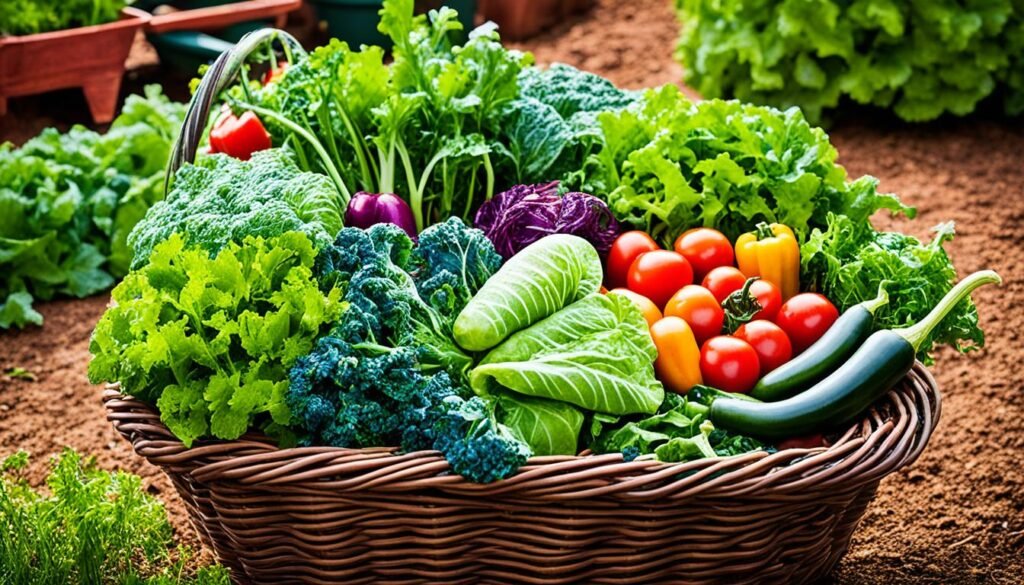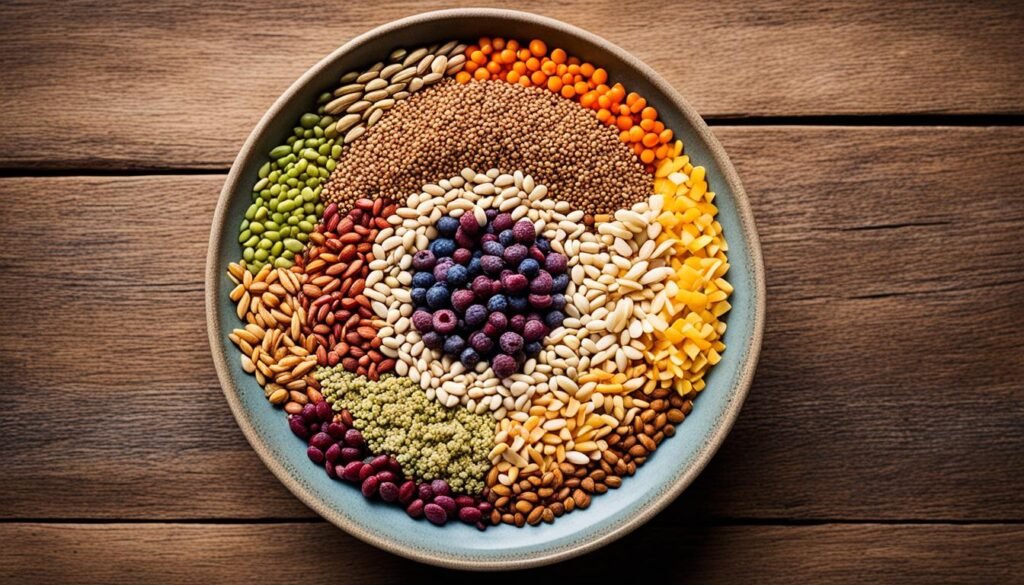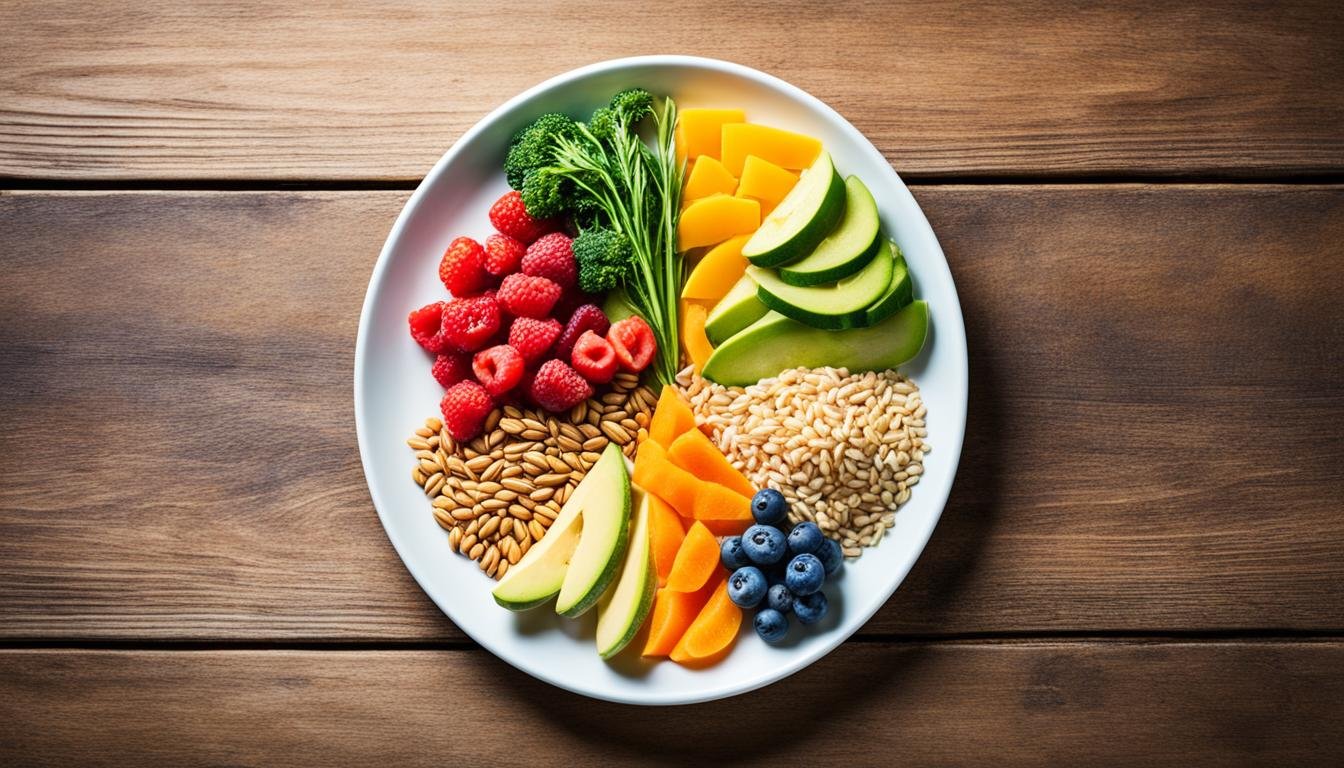What foods to eat every day?
I love living a balanced, healthy life. Being Nigerian, I’ve seen how important good food is for health. Every day, the food we pick helps our immune system, keeps our hearts healthy, and lowers disease risks.
To stay healthy, eat a mix of fruits, vegetables, lean proteins, whole grains, and healthy fats. These give your body what it needs to work well. A balanced diet of whole foods ensures you get all the vitamins, minerals, antioxidants, and more.
Adding wholesome, natural foods to your diet can change your life. It boosts your immune system, heart, and lowers disease chances. This nutritional plan can really make you feel good every day.
Key Takeaways
- Important to eat nutrient-dense foods for good health.
- Whole, minimally processed foods offer needed nutrients and antioxidants.
- A mix of fruits, veggies, proteins, grains, and fats helps your immune system and fights disease.
- Good diet and habits support your wellness and well-being.
- Eating nutrient-dense foods daily is key for good nutrition and health.
Fruits: A Burst of Natural Sweetness
Vibrant fruits are key to a well-balanced meal, rich in vitamins, fiber, and antioxidants. They offer not just good taste but also health benefits. By exploring these natural treats, you can boost your well-being with ease.
Berries: Packed with Fiber and Antioxidants
Berries like blueberries and strawberries are more than just tasty. They’re filled with fiber and antioxidants. These nutrients are good for your gut, keep you full, and benefit your heart. Plus, the antioxidants they hold protect your body’s cells and might even prevent some illnesses. You can eat berries in many ways, such as fresh, frozen, or adding them to meals.
Apples: A Crunchy and Fibrous Delight
Apples are everywhere and full of fiber, vitamins, and antioxidants. They keep you full and the antioxidants lower disease risk. Enjoy apples by themselves or in various dishes. They make a great snack anytime.
Citrus Fruits: A Vitamin C Powerhouse
Citrus fruits have a lot of vitamin C, like oranges and lemons. Just one big orange or a cup of juice a day gives you enough vitamin C. This vitamin helps your immune health and is a strong antioxidant. Citrus fruits also have fiber, folate, and other good stuff for your health. Make juices or add them to snacks to meet your daily needs.
Vegetables: Nutritional Powerhouses
Leafy greens like spinach and kale are full of vitamins, minerals, and antioxidants. They have vitamins A, C, and K, along with fiber, iron, and calcium. Eating more leafy greens can help with weight, diabetes, and keep your brain active. You can eat them in salads, sauté them, or put them in smoothies.
Leafy Greens: A Versatile Superfood
Vegetables and especially leafy greens are like a vitamin store. They provide lots of minerals and antioxidants. The dark ones offer vitamins A, C, and K, plus fiber, iron, and calcium. Adding more leafy greens to your meals can make you healthier. They help keep your weight in check and lower your chances of getting sick.
Cruciferous Veggies: Cancer-Fighting Companions
Vegetables like broccoli, cauliflower, and Brussels sprouts fight cancer. They are full of glucosinolates, which clean out toxins. They also have antioxidants that protect your cells and cut down swelling. Eating these veggies raw or steamed keeps their good stuff intact. By adding more to your meals, you might stay healthier and lower your cancer risk.

What Foods to Eat Every Day?
Eating many types of healthy foods every day is key to staying well. Nuts and seeds and legumes are super important. They give us lots of good stuff, like protein and fiber.
Nuts and Seeds: Nutrient-Dense Snacks
Think about nuts and seeds as go-to snacks. They’re full of good-for-you things. Despite their calories and fats, they can cut the risk of diseases. For instance, almonds are a top pick because they have a lot of vitamin E, antioxidants, and magnesium. This helps keep your heart and body strong.
Chia seeds are also great to add to your meals. They give you a big dose of fiber, magnesium, and more key nutrients. Mixing different nuts and seeds into your diet can boost your healthy fats, protein, and fiber.
Legumes: Plant-Based Protein Powerhouses
Beans, lentils, and peanuts are powerful sources of plant-based protein and fiber. They help keep you full while staying low in calories. Legumes are also packed with fiber, iron, and important vitamins and minerals.
But, some people might have tummy problems with legumes and find it hard to absorb nutrients. Soaking them before cooking can make them easier to digest. Enjoying bean dishes, lentil soups, or peanut snacks is a great way to keep healthy.
Whole Grains: Fuel for the Body
Whole grains like oats, brown rice, and quinoa are key for a good diet. They provide important nutrients and fiber. Whole grains are good for keeping weight in check and offer vitamins, magnesium, and fiber.
Oats: A Hearty and Filling Choice
Oats are high in fiber and beta-glucans, which help lower bad cholesterol. They are good for your gut too. Oats are perfect for breakfast, in forms like oatmeal or granola. They keep you full and are nutritious.
Quinoa: A Gluten-Free Grain Powerhouse
Quinoa is full of nutrients and great for gluten-free diets. It’s rich in fiber and plant-based protein. This makes it a top choice for meals or snacks. Quinoa is unique because it has all the essential amino acids. It adds an interesting texture to dishes such as breakfast bowls, salads, and pilafs. Plus, it’s a good source of minerals like iron, magnesium, and phosphorus.

Lean Proteins: Building Blocks for Strength
Eggs are a powerhouse of nutrition and can fit into any diet. They offer top-notch protein, along with vitamins and minerals for your eyes. Eggs even have special substances that protect your skin from the sun. They are both easy to use and easy on your wallet. Eggs make a great addition to meals, whether they’re scrambled, fried, or in baked treats. Including eggs in your diet brings lots of nutrients and keeps you healthy.
Fish: A Source of Omega-3 Fatty Acids
Fish, especially oily types such as salmon, are rich in omega-3 fatty acids. These healthy fats are great for you in so many ways. They lower the chances of getting heart disease, stroke, and cancer. Omega-3s are key for a healthy brain and can help fight off inflammation. Adding fish like salmon, sardines, and tuna to your meals is a smart move. They’re lean, full of protein, and good for your heart and mind.
Conclusion
Eating a wide range of healthy foods is key to staying well. This includes items like fruits, veggies, whole grains, lean meats, and good fats. Choosing these over highly processed options ensures your body gets what it needs to thrive.
Specifically, foods like berries, greens, nuts, and eggs are packed with nutrients. They help keep your immune system strong and lower the chances of getting sick. Adding a mix of natural foods to your meals each day will boost your health.
Making smart food choices supports your health and life quality. A balanced, nutrient-rich diet is the secret. It fuels your body to reach its best state and meet your wellness goals.






